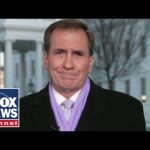In a surprising development, efforts to negotiate a Middle Eastern cease-fire have been significantly influenced by President-elect Donald Trump and his team. According to the State Department, Trump’s involvement has proven critical in getting this deal over the line. While it’s not entirely unprecedented for envoys from both an outgoing and an incoming administration to sit down together, it certainly raises some eyebrows. Nonetheless, the presence of Trump’s team has been acknowledged as a key factor behind the emerging agreement.
Jason Miller, a senior adviser to Trump, wasted no time in praising the former president’s effectiveness in bringing peace to the Middle East—not once, but twice! The statement suggested that had it not been for Trump’s decisive leadership, this negotiation would likely have stalled indefinitely. Miller even considers the timeline of these developments as worthy of a Nobel Prize nomination, citing the historical significance of these negotiations happening before Trump officially takes office.
But let’s pivot to the player calling the shots in this scenario—Steve Witkoff. Why was he tapped by Trump for this mission? Well, it turns out that Witkoff isn’t just any negotiator. His close relationship with Trump means that when he speaks, people know it carries the weight of Trump’s intent. He’s also recognized as someone with a nontraditional background, which, according to Miller, is exactly what the do-nothing experts in D.C. have missed in their decades of failed diplomacy. Witkoff’s past successes in international negotiations, particularly concerning North Korea and prior peace deals, have positioned him uniquely for this moment.
Despite these optimistic talks, questions still linger regarding the details of the cease-fire agreement. Critics have raised concerns about releasing a thousand Palestinian prisoners, some of whom have questionable backgrounds. Miller acknowledges the importance of the details but emphasizes that the mere fact a cease-fire is on the table and hostages are promised to be released is a significant achievement. He argues that none of this would have materialized without Trump setting clear expectations and demonstrating that there would be consequences for any inaction.
Looking forward, there’s an interesting subplot developing around Trump contemplating a change in stance regarding TikTok. In a world where everything is interconnected, the question arises: how can one champion an America First policy while potentially allowing a Chinese-owned app to continue operating here? It’s a tricky situation. Miller explained that if the app can be flipped to be under American control and away from any influence from the Chinese Communist Party, it could be worth considering.
As Trump prepares to assume his role and the world watches, it’s evident that he is not only making waves with his diplomatic efforts but also navigating the complex landscape of modern social media. In the coming weeks, all eyes will certainly be on how these negotiations unfold and what implications they hold for American foreign policy and domestic concerns alike. The stakes are high, and the pressure is palpable!




